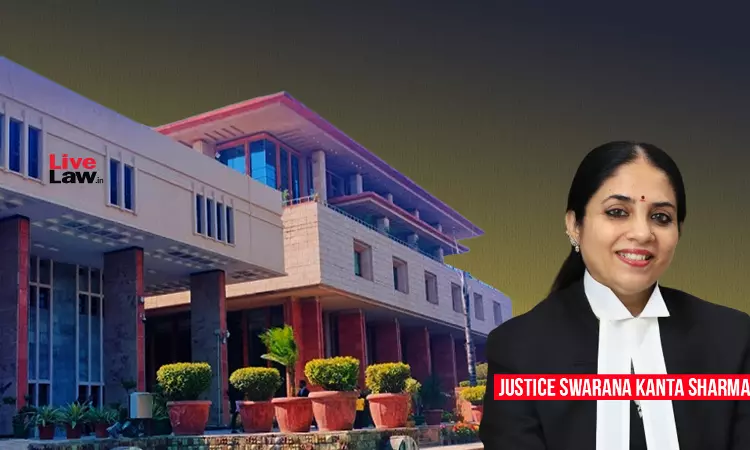- Home
- /
- High Courts
- /
- Delhi High Court
- /
- Bigamy | Inability To Prove...
Bigamy | Inability To Prove 'Saptapadi' Qua Partner's Second Marriage At Summoning Stage Can't Be Misused To Evade Legal Consequences: Delhi HC
Nupur Thapliyal
5 Jan 2024 3:24 PM GMT
The Delhi High Court has observed that the absence of law making adultery an offence cannot provide individuals a “blanket immunity” where they can marry others in secrecy during subsistence of their first marriage. Justice Swarana Kanta Sharma added that such individuals cannot later claim that the first partner must prove that the second marriage was solemnized after performing...
The Delhi High Court has observed that the absence of law making adultery an offence cannot provide individuals a “blanket immunity” where they can marry others in secrecy during subsistence of their first marriage.
Justice Swarana Kanta Sharma added that such individuals cannot later claim that the first partner must prove that the second marriage was solemnized after performing essential rites and ceremonies, even for summoning the individual as an accused for the offence of bigamy, since adultery is no longer an offence.
“Thus, in such a situation, the Courts cannot afford to leave individuals without a legal remedy, especially those wives or husbands, whose partners have entered into another marriage,” the court said.
It added that mere inability of one partner, either a wife or a husband, to prove performance of saptapadi by the other while marrying second time, at the stage of summoning itself, should not be misused as a loophole to evade legal consequences.
“Thus, this Court takes cognizance of the fact that the inability of one partner to prove performance of saptapadi by the other partner while marrying for the second time during subsistence of first marriage, at the stage of summoning itself, especially when the other partner may have solemnized such marriage with the third person in secrecy, should not be exploited as a clever tactic to circumvent the legal consequences of committing offence of bigamy,” the court said.
It added: “While legal proceedings do involve strategic elements, such smart maneuvers should not be allowed to compromise the principles of fairness and justice.”
Furthermore, Justice Sharma said that it cannot be expected that the husband will get married for the second time, during the subsistence of earlier marriage, after informing the first wife or in her presence so that she can collect evidence of his subsequent marriage and the ceremonies performed.
“Therefore, to insist that all the ceremonies of marriage, as performed for the purpose of a valid marriage, must be proved for the purpose of even summoning the accused for offence of bigamy will put the first wife into a situation where though she knows that her husband is living with another woman after performing some kind of marriage ceremony, and are living and projecting themselves as husband and wife, but still she can take no action against him since one of the ceremonies of marriage could not be proved by her,” the court said.
It further observed that the offence of bigamy, i.e. getting married to another person while being legally married to another, is a “serious prohibited behaviour” which, by its special nature, gives rise to special problems for the victim concerned.
“In acknowledging the evolving perspectives on relationships in contemporary society, it is undeniable that a significant number of individuals no longer prioritize or hold in high regard the institution of marriage. The preference for live-in relationships, which is legally permissible in our country, is reflective of these changing societal norms,” the court said.
It added: “The law cannot be powerless to stop, punish or limit clandestine marriages and unions when the first wife or husband are alive and the valid marriage subsists, as now a spouse performing a second clandestine marriage would not also be liable to punishment for adultery as it is no more an offence.”
The court was dealing two pleas moved by a wife challenging a sessions court order which set aside a metropolitan magistrate's order summoning the husband, his parents and his alleged second wife as accused. The wife had filed a complaint under Section 200 of CrPC alleging that the husband was guilty of bigamy and his parents and the alleged second wife were guilty of abetment of the said offence.
It was the wife's case that the Sessions Court erred in holding that there was no oral or documentary evidence led by her regarding performing of ceremonies like Saptapadi around the scared fire during husband's second marriage, by ignoring her testimony and documentary evidence.
It was also submitted that the photograph of the second marriage and subsequent birth of a child from the marriage was a pivotal piece of evidence ignored by the Sessions Court.
Though the husband took a plea that he was in a mere live-in-relationship with the alleged second wife, the court said that the issue as to whether he was living in such relationship without any ceremony of marriage could be decided only during trial.
“The complexity of issues such as the validity of marriage and performance of rituals should be reserved for comprehensive scrutiny during the trial proceedings, where evidence can be presented, cross-examined, and evaluated in a more elaborate manner,” the court said.
Accordingly, the court set aside the impugned order and upheld the summoning order passed by the Metropolitan Magistrate.
Title: POOJA SHARMA BAJAJ v. KUNAL BAJAJ & ORS.
Citation: 2024 LiveLaw (Del) 15


